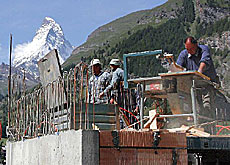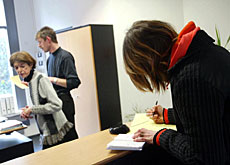Jobs abroad become scarcer for young Swiss

Young Swiss wanting to gain work experience abroad are finding it increasingly difficult to get jobs because of the sluggish economy.
But better recognition of Swiss qualifications and the lifting of restrictions on working in the European Union mean they are no longer at such a disadvantage when it comes to competing for work.
“Interest is very high among young people about gaining work experience abroad,” said Béatrice Stucki, head of Intermundo, the association for the promotion of youth exchanges.
The organisation, which arranges internships and voluntary work in Latin America, Africa and Asia, places emphasis on the importance of cultural exchange – so-called “soft skills.”
But Urs Stampfli, head of the Careers Guidance Centre in canton Zurich, warns against having any romantic ideas of working abroad.
“Hitchhiking around the world is not at all useful on the labour market, but if someone’s CV can show some experience of working for a firm abroad, this is will help them very much,” Stampfli told swissinfo.
Many criteria
But foreign work experience, while useful, is not seen as essential by many Swiss firms.
Credit Suisse, Switzerland’s second-largest bank, employs around 200 Swiss in 50 countries.
“The question of whether work experience abroad is important depends on the position,” said spokeswoman Nicole Pfister-Bachmann.
Other factors that are useful for a career are training, experience and soft skills.
Food giant Nestlé, which is based in Vevey, has a quarter of a million employees of which 334 are Swiss working abroad. It says it often recruits people straight from university and then sends them abroad.
Iraq
Interest in working abroad tends to ebb and flow. According to Mechthild Nussbaumer from the Biel-based Center for Information, Advice and Training – Professions relating to International Cooperation, there has been a noticeable increase due to the war in Iraq.
Organisations such as the charity, Helvetas, the International Committee of the Red Cross (ICRC) and the Swiss Agency for Development and Cooperation advertise at the Biel centre.
“Every year, about 4,500 to 5,000 people contact us,” said Nussbaumer. There are normally around 500 jobs on offer.
There are now many opportunities for Swiss looking to undertake humanitarian work abroad.
Since Switzerland joined the United Nations in 2002, they can apply to join the world body, providing they are not older than 32 and have a university degree.
Last year the ICRC had between 1,200 and 1,400 people on site around the world – of whom 43 per cent were Swiss.
Bilaterals
Another factor that has eased access to labour markets closer to home is the country’s bilateral agreements with the European Union, which allow for the free movement of people.
But Roland Flükiger, head of emigration and trainees at the Federal Office of Immigration, Integration and Emigration, says the economic downturn in many countries has not made things easy.
“When there isn’t work, having the free movement of people [accord] doesn’t help,” he said.
Professional qualifications are also a useful passport to making a fresh start abroad.
“But this normally only applies to so-called regulated professions,” said Carmen Steimann from the Federal Office for Professional Education and Technology, adding that this included doctors, pharmacists and lawyers.
“For other diplomas, such as a business diploma, employers only need to be convinced that the person is good enough,” added Flükiger.
The Bologna reforms, which aim for the universal recognition of university degrees in Europe, should also make it easier for Swiss who want to work abroad.
But Stampfli says other problems still remain. “Nowadays, firms mostly want people with experience, and then they send them abroad. But young people want to acquire this [experience] first,” he said.
swissinfo, Philippe Kropf
Nestlé has 334 Swiss working abroad; Credit Suisse around 200.
About 520 Swiss worked abroad for the ICRC in 2003.
Every year, 30,000 Swiss leave the country.
But it is not known how many of them are working abroad.
Many young Swiss are keen to gain work experience abroad.
University and many other diplomas are usually recognised.
The bilateral agreements mean that the Swiss may now work in the European Union, but jobs are scarce.
Many firms prefer to send people abroad who already have had experience of doing so.

In compliance with the JTI standards
More: SWI swissinfo.ch certified by the Journalism Trust Initiative


You can find an overview of ongoing debates with our journalists here. Please join us!
If you want to start a conversation about a topic raised in this article or want to report factual errors, email us at english@swissinfo.ch.